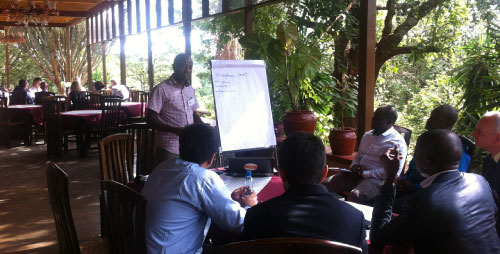We held our annual mAgri working group in Nairobi last week and I wanted to share some of the highlights for those who couldn’t join us. The working group is part of our range of knowledge sharing activities and during the event we bring together agriculture and mobile partners to share learnings about setting up mAgri services.
The first day was spent with the mFarmer grantees and we had consortium members from HandyGo, Tigo Tanzania, airtel Kenya and Orange Mali who shared their experience and challenges of launching Agri VAS. On the second day mAgri experts from 4 continents and 14 countries gathered to share their experiences; and the third day was spent getting feedback about the new airtel Kenya service “Sauti ya Mkulima” with farmers who were attending an agriculture extension clinic in Embu run by CABI and the Ministry of Agriculture.
Here are some of the topics that I found most interesting from last week’s events.
Partnerships
At the event we had folks representing research agencies, ministry of agriculture, social entrepreneurs, VAS providers, content partners, donor agencies and mobile operators from across Africa. The mAgri team often talk about strong partnerships being a key part of developing Agri VAS and the event showcased many examples of these types of partnerships that have formed with a common goal to develop services for small holders. As with any public-private partnership, whilst there has been success, it was recognised that it was not without challenges. We heard about partners’ differences in contract types and payment schedules, available resources and short and long-term ownership – all these things need to be worked through and flexibility is required from all the types of organisations as they develop these new types of partnerships.
Content and service development
The debate about content has evolved from understanding “how to do it” to “how to do it better”. The first theme of questions was around the content management process – who are the best people to manage, own and quality assure content?; how to make the process more efficient and cost effective?; how to align with extension practices?. The second theme centred on service improvement and the service providers talked about how they are setting up the necessary databases and analytics to track usage behaviour and create a strategy for on-going service and content improvement. We also debated how to create content that is entertaining and engaging to promote behavioural change – on this theme it seems there is a lot to learn from other media formats – please do let us know if you have some good examples and we can share on a blog post.
Future Innovation
Products are organically evolving as service providers learn more about the demand from users, services that bundle a variety of functionalities and content types together were repeatedly cited as the future of mobile agriculture. We heard about numerous service providers’ plans to develop agri-information services, financial services and products that increase the efficiency of agricultural value chains. A demand for Agricultural MFS (mobile financial services) was reconfirmed by many participants. Agricultural MFS have a great potential to change the way farmers do business, starting with the way they save for the inputs or equipment, access and process payments for credit and insurance. We also got a sneak peak of innovations in the development such as mobile services that link buyers and input providers to producers while providing access to information and digitising existing cash transactions between them. It’s apparent that the private sector and especially agri-business are ready to invest in mobile services.
The discussion often came back to the theme of “big data” and the opportunity for service providers to capture, analyse and share information for more holistic decision making.
Marketing
We also discussed common approaches to marketing Rural VAS, including Agri VAS, and some of the techniques of moving the customer through the journey of experiencing the service. The customer journey starts from the Unaware phase, followed by the Aware phase when the customer first learns about the service, Trial phase when the user tries the service for the first time, if the first trial is successful and results in positive experience for the user, its followed by Usage and eventually a Regular Usage stage. We all agreed that Agri VAS is a social innovation, and lots of education is needed to incentivise the customer to try the service, explain the value proposition and demonstrate how to use the product.
There was a debate on the role of below the line and above the line marketing strategies between the service providers. Although VAS providers and MNOs have a dramatic difference in the quality and range of assets they could leverage for marketing, it was agreed that partnering with existing agent networks – either through farmers’ groups or MNOs’ distribution and sales channels is a success factor for reaching rural areas. Backing up targeted below-the-line marketing with mobile advertising campaigns and on channels such as vernacular radio stations helps to create the awareness for the service. Attendees described how above the line campaigns such as radio or TV are very expensive and should only be used once below-the-line marketing strategy is explored.
We’ll be writing more blogs on the topic of marketing as we understand what marketing approach works and offers a good return on investment. If there are interesting examples of marketing Agricultural VAS or other Rural VAS please do share with us, and we will be able to showcase it either through case studies or blogs.


